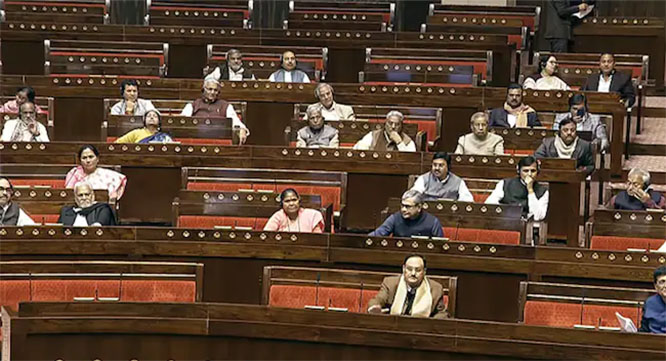New Delhi: The BJP's strength in the Rajya Sabha fell by four Saturday after as many nominated members - Rakesh Sinha, Ram Shakal, Sonal Mansingh, and Mahesh Jethmalani - completed their term.
All four were chosen - as non-aligned members - by President Droupadi Murmu on the advice of the ruling party, and formally allied with Prime Minister Narendra Modi's government afterwards.
Their retirement brings the BJP's strength down to 86 and that of the party-led National Democratic Alliance to 101, which is below the current majority mark of 113 in the 245-member House.
The current strength of the Rajya Sabha is 225.
The Congress-led INDIA bloc has 87, of which the Congress has 26, Bengal's ruling Trinamool 13, and the Aam Aadmi Party and the DMK, in power in Delhi and Tamil Nadu, have 10 each.
Parties not aligned with either the BJP or the Congress - such as ex-Telangana Chief Minister K Chandrashekar Rao's BRS - nominated MPs and independents hold the rest.
What Do BJP's Reduced Numbers Mean?
It means the government is now reliant on non-NDA parties - such as ex-ally AIADMK of Tamil Nadu and former Andhra Pradesh Chief Minister Jagan Mohan Reddy's YSR Congress Party - to pass bills in the Upper House. As of now, assuming the BJP can count on the 15 votes from NDA parties' MPs, it will need a minimum of 13 additional 'aye's cast in its favour to push through bills.
The YSRCP (11) and the AIADMK (4) are the BJP's two most obvious 'allies', even if its relationship with the latter has been fractious since they split in December last year, months before the election.
Jagan Reddy's YSRCP has lent issue-based support to the BJP in the past, so at least 11 votes seem assured for Mr Modi's party. Former Odisha Chief Minister Naveen Patnaik's BJD lent similar support too but, since it was beaten by the BJP in the May-June state election, has said it will not do so now.
The BJD has nine Rajya Sabha MPs.
If the AIADMK is unwilling to offer support, and the BJD of Naveen Patnaik has turned away, the BJP will then turn to votes from nominated members.
There are a total of 12 nominated members in the Rajya Sabha. Although non-aligned when brought in, since they are chosen by the government, in practice they tend to support the ruling party.
Non-aligned parties like the BRS, which has four MPs, and independents may also come into play.
Vacant Seats
There are a total of 20 seats vacant at this time, including 11 held by elected members for which polls are expected this year. Of these, there are two seats each in Maharashtra, Assam, and Bihar, and one each in Haryana, Rajasthan, Madhya Pradesh, Telangana, and Tripura.
The BJP-led alliance has the numbers to win seven - from Assam, Bihar, Rajasthan, Madhya Pradesh, and Tripura. And if it can keep its flock together in Maharashtra, it will win two more from there.
This could give the BJP as many as nine extra seats. If it wins those, and with the nominated members' votes, as well as the YSRCP's, it will have more than enough to cross the majority mark.
There are also four seats vacant from Jammu and Kashmir, which is expected to hold an Assembly election by September 30, in line with a Supreme Court order.
The Telangana seat is likely to be won by the Congress, which swept to power last year.
This is crucial because it will give the party enough votes to claim the Leader of the Opposition post in the Rajya Sabha. The Congress will then hold the LoP seat in both Houses.








Comments
Add new comment